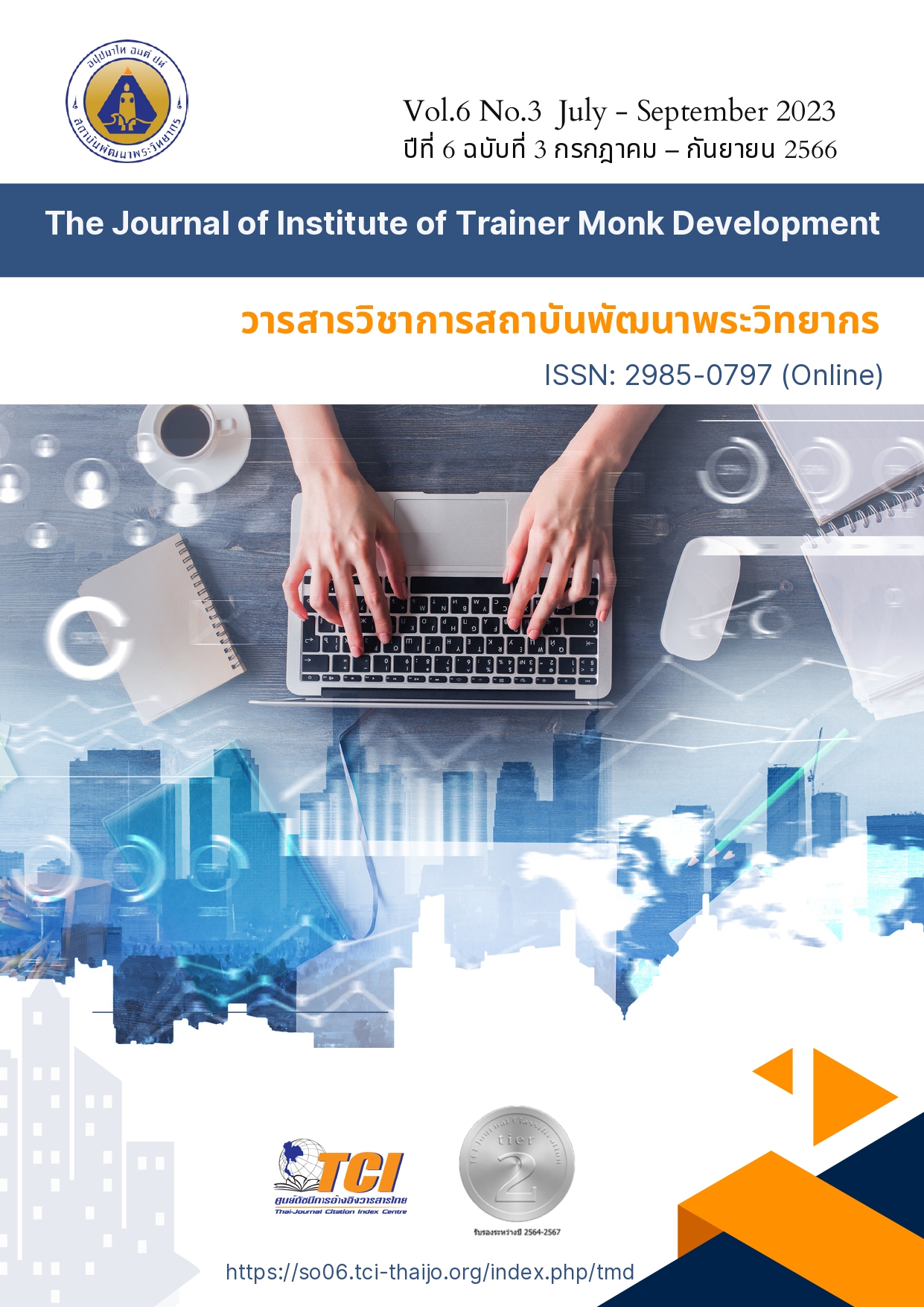Guidelines for Promoting Moral Integrity in Elementary School Muang District, Trat Province
Main Article Content
Abstract
This research study to the objectives were: 1) to study honesty in Buddhist scriptures in elementary schools in Muang district, Trat province; 2) to study honest practices of students in Muang district, Trat province; and 3) to research methods to promote moral integrity in schools in Mueang district, Trat province.
The results show that: 1) The principles of honesty in building an understanding of integrity principles can be made by inserting them into formal educational activities. Teach in all subjects. We can see that every society has different members or individuals who have different roles and functions that are the same and some are different. The principle of honesty guides us not to cheat or act with a pure heart and sincerity. Set yourself up with the sincerity to be honest. The reality in relation to oneself and society is that.
2) The behavior of students must have characteristics that contribute to being recognized, respected, and trustworthy. It is also nice to associate with and must be understand that every society makes up of different members or individuals based on different roles and functions. Honesty is not only important. There must be discipline, rules and regulations to control the behavior of people in society so that it is orderly and good. It is one pattern. We will live together happily.
3) The application of honesty principles must be truthful to oneself and others; It is a guide for further doing good things and requires children to practice being strong themselves. When there is an argument in the group, they must use reason until the other person has to accept.
Article Details

This work is licensed under a Creative Commons Attribution-NonCommercial-NoDerivatives 4.0 International License.
บทความที่ได้รับการตีพิมพ์เป็นลิขสิทธิ์ของวารสารวิชาการสถาบันพัฒนาพระวิทยากร
ข้อความที่ปรากฎอยู่ในบทความที่ได้รับการตีพิมพ์ในวารสาร ถือเป็นความรับผิดชอบของผู้เขียนบทความ และข้อคิดเห็นนั้นไม่ถือว่าเป็นทัศนะและความรับผิดชอบของกองบรรณาธิการวารสารวิชาการสถาบันพัฒนาพระวิทยากร
References
กรมวิชาการ. (2541). คู่มือการเสริมสร้างค่านิยม คุณธรรมจริยธรรมและวินัย ระดับประถมศึกษา. (พิมพ์ครั้งที่ 2). กรุงเทพมหานคร: โรงพิมพ์คุรุสภาลาดพร้าว.
กระทรวงศึกษาธิการ. (2545). หลักสูตรการศึกษาขั้นพื้นฐาน พุทธศักราช 2544. (พิมพ์ครั้งที่ 2). กรุงเทพมหานคร: โรงพิมพ์องค์การรับส่งสินค้าและพัสดุภัณฑ์.
พระเทพเวที. (2536). การศึกษาเครื่องมือพัฒนาที่ยังต้องพัฒนา. มปท: ส่องสยาม.
มหาจุฬาลงกรณราวิทยาลัย. (2539). พระไตรปิฏกฉบับภาษาไทย. กรุงเทพฯ: โรงพิมพ์มหาจุฬาลงกรณราชวิทยาลัย.
วีระพงศ์ ถิ่นแสนดี. (2550). “การพัฒนาคุณธรรมจริยธรรมนักเรียนโรงเรียนสิงห์สะอาด อำเภอสหัสขันธ์ จังหวัดกาฬสินธุ์”. วิทยานิพนธ์ครุศาสตรมหาบัณฑิต สาขาวิชาบริหารการศึกษา.บัณฑิตวิทยาลัย: มหาวิทยาลัยราชภัฏมหาสารคาม.
สำนักงานคณะกรรมการการประถมศึกษาแห่งชาติ. (2543). กระบวนการปฏิรูปการเรียนรู้. กรุงเทพมหานคร: สำนักงานคณะกรรมการการประถมศึกษาแห่งชาติ.
สำนักงานปฏิรูปการศึกษา. (2562). พระราชบัญญัติการศึกษาแห่งชาติ (ฉบับที่ 4).กรุงเทพมหานคร: คุรุสภา.
สมปอง ช่วยพรม และวารีรัตน์ แก้วอุไร. (2559). การพัฒนารูปแบบกิจกรรมเสริมสร้างจิตสาธารณะ ตามหลักการเรียนรู้แบบรับใช้สังคมสำหรับนักเรียนระดับประถมศึกษา. วารสารมหาวิทยาลัยราชภัฎลำปาง, 5(2): 133-146.
อัจฉริยา สุรวรเชษฐ. (2560). ศึกษารูปแบบการพัฒนาพฤติกรรมความซื่อสัตย์ต่อตนเองของนักเรียนระดับประถมศึกษา. วิทยานิพนธ์ปรัชญาดุษฎีบัณฑิต สาขาวิชาการบริหารการศึกษา. คณะศึกษาศาสตร์: มหาวิทยาลัยบูรพา.
พระครูนิวิฐวิริยคุณ ฐิตวิริโย (โปธาวิชัย). (2549). “การพัฒนาคุณธรรมจริยธรรมนักเรียนของโรงเรียนการ กุศลของวัดในพระพุทธศาสนา จังหวัดลําพูน”. วิทยานิพนธ์ครุศาสตรมหาบัณฑิตสาขาวิชาการบริหารการศึกษา. บัณฑิตวิทยาลัย: มหาวิทยาลัยราชภัฏลําปาง.


